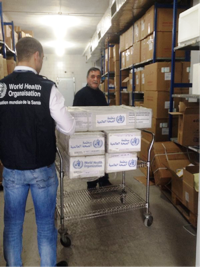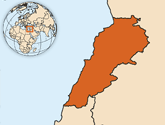 Boxes of marker pens were delivered to the Ministry of Public Health quarantine warehouse for the polio campaign third roundBeirut, 10 March 2014 - Lebanon was certified as a country free of poliomyelitis by the Regional Commission for Certification of Poliomyelitis Eradication in 2002. The last indigenous poliomyelitis case was reported on 8 June 1994. Surveillance for acute flaccid paralysis (AFP), which is the gold standard for detecting potential cases of poliomyelitis, started in Lebanon in 1994. Routine immunization against poliomyelitis with oral polio vaccine (OPV) has been mandatory since 1968. A single dose of inactivated polio vaccine (IPV) was introduced in 2011. Both OPV and IPV are currently in use in Lebanon. Coverage for IPV1 is high at 96% but coverage for OPV3 is lower at 77%; in the private sector children are most likely to receive IPV rather than OPV.1
Boxes of marker pens were delivered to the Ministry of Public Health quarantine warehouse for the polio campaign third roundBeirut, 10 March 2014 - Lebanon was certified as a country free of poliomyelitis by the Regional Commission for Certification of Poliomyelitis Eradication in 2002. The last indigenous poliomyelitis case was reported on 8 June 1994. Surveillance for acute flaccid paralysis (AFP), which is the gold standard for detecting potential cases of poliomyelitis, started in Lebanon in 1994. Routine immunization against poliomyelitis with oral polio vaccine (OPV) has been mandatory since 1968. A single dose of inactivated polio vaccine (IPV) was introduced in 2011. Both OPV and IPV are currently in use in Lebanon. Coverage for IPV1 is high at 96% but coverage for OPV3 is lower at 77%; in the private sector children are most likely to receive IPV rather than OPV.1
Annual national immunization day campaigns (NIDs) were conducted from 1995 to 2000. In 2003, an additional NID was conducted in response to the importation of a case which was found to be caused by a virus closely related to the strains circulating in India. Localized supplementary immunization activities are occasionally conducted in border areas and in areas with low routine vaccination coverage.
In October 2013, cases of poliomyelitis were detected in Syria. This outbreak has led to the declaration of a national health emergency in Syria and has initiated a regional emergency response plan. As of 3 March 2014, UNHCR has recorded 950 479 Syrian refugees, including both those registered and those awaiting registration. This represents close to 20% of the total population inside the country.
Due to the Lebanese government’s no-camp policy, Syrian refugees are spread over 1400 localities, with many staying in informal tented settlements and collective shelters. In response to the crisis and in accordance with the WHO/UNICEF poliomyelitis Middle East emergency response plan, the Lebanese Ministry of Public Health carried out two NIDs in November 2013 and December 2013 to protect all children under 5 years of age with additional doses of vaccine.
Furthermore, the Ministry has reinforced its routine vaccination through the ‘Reach Every Child’ approach, and mandatory poliomyelitis vaccination is being provided to children under 5 years of age arriving at the four official border land crossings. Ongoing immunization activities are also taking place at the five UNHCR registration centres, providing polio vaccination plus measles in addition to vitamin A supplements.
While the country needs to maintain high vigilance with AFP surveillance, no case of poliomyelitis has been confirmed in Lebanon.
WHO and UNICEF will support the Ministry of Public Health financially and technically to conduct two further rounds of polio NIDs to immunize all Lebanese and non-Lebanese children under 5 years of age, irrespective of previous immunization history. To this end, 1.5 million doses of trivalent OPV are under procurement through UNICEF, and WHO will be providing logistical and technical support to the health district office, conducting field assessment, developing and funding implementation of microplans related to NIDs.
A nationwide social mobilization campaign has started including communication strategies targeting families, communities and practitioners, with television/radio spots and mobile phone SMS in order to raise campaign awareness and ultimately reach every child.
1Strategic Plan for Polio Outbreak Response in the Middle East, WHO-UNICEF, November 2013.








